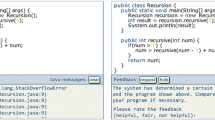Abstract
This paper presents the principles and the architecture of PROTO-TEG, a self-improving tutor in geometry. This system is able to discover criteria useful for selecting the didactic strategies it has at its disposal. These criteria are expressed as characteristics of the student model. They are elaborated by comparing student model states recorded when a strategy was effective and those recorded when the same strategy was not effective. This comparison is performed by machine learning methods, or, more precisely, by learning concepts from examples. An empirical experiment was performed in order to assess the self-improving functions; conditions were discovered for five of the nine didactic strategies. However, this new knowledge did not lead to PROTO-TEG being more efficient in terms of student performance.
Similar content being viewed by others
References
Dillenbourg, P. (1988). Un modele d'acquisition des connaissances par les tutoriels intelligents. Proceedings of Intelligent Tutoring Systems, June 1–3, Montreal, 145–153.
Dillenbourg, P. and Goodyear, P. (1989). Towards reflective tutoring systems: self-improvement and self-representation. In D., Bierman, J., Breuker and J., Sandberg (Eds.), Artificial intelligence and education: Proceedings of the 4th AI & Education conference. IOS, Amsterdam.
Duchastel, P. and Imbead, J. (1986). Instructible ICAI. Doc. 86–07 du Laboratoire d'Intelligence Artificielle en Education. Université Laval, Quebec.
Kimball, R. (1982). A self-improving tutor for symbolic integration. In D., Sleeman and J. S., Brown (Eds.), Intelligent tutoring systems. Academic Press: London.
Hartley, J. R. and Sleeman, D. H. (1973). Towards more intelligent teaching systems. International Journal of Man-Machine Studies, 5, 215–236.
Howe, J. A. M. (1978). Artificial intelligence and computer-assisted learning: ten years. Programmed Learning and Educational Technology, 15(2), 114–125.
Langley, P. (1983). Learning search strategies through discrimination. International Journal of Man-Machine Studies, 18, 513–541.
Langley, P. and Ohlsson, S. (1984). Automated cognitive modelling. Proceedings of National Conference on Artificial Intelligence, Austin, Texas, 193–197.
Mitchel, T. M., Utgoff, P. E. and Banerji, R. (1984). Learning by experimentation: acquiring and refining problem solving heuristics. In R. S., Michalski, J. G., Carbonell and T. M., Mitchell (Eds.), Machine learning: an artificial intelligence approach. New York: Springer-Verlag.
Mitchell, T. L., Keller, R. M. and Kedar-Canelli, S. T. (1986). Explanation-based learning: a unifying view. Machine Learning, 1, 47–80.
Ohlsson, S. (1987). Some principles of intelligent tutoring. In R., Lawler and M., Yazdani, Artificial intelligence and education, Volume 1: learning systems and intelligent tutoring systems. Norwood, NJ: Ablex.
O'Shea, T. (1979). Self-improving tutoring systems. Basel: Birkhauser Verlag.
Self, J. A. (1977). Student models and artificial intelligence. Computers and Education, 3, 309–312.
Self, J. A. (1986). The application of machine learning to intelligent tutoring systems. In J. A., Self, (Ed.), Intelligent computer aided instruction. London: Chapman and Hall.
Self, J. A. (1988). Bypassing the intractable problem of student modelling. Proceedings of Intelligent Tutoring Systems, June 1–3, Montreal, 18–24.
Stubbs, M. and Piddock, P. (1985). Artificial intelligence in teaching and learning: an introduction. Programmed Learning and Educational Technology, 22(2), 150–157.
Tennyson, R. D. and Park, O. (1980). The teaching of concepts: a review of instructional design research literature. Review of Educational Research, 50, 50–70.
Author information
Authors and Affiliations
Rights and permissions
About this article
Cite this article
Dillenbourg, P. Designing a self-improving tutor: PROTO-TEG. Instr Sci 18, 193–216 (1989). https://doi.org/10.1007/BF00053359
Issue Date:
DOI: https://doi.org/10.1007/BF00053359




